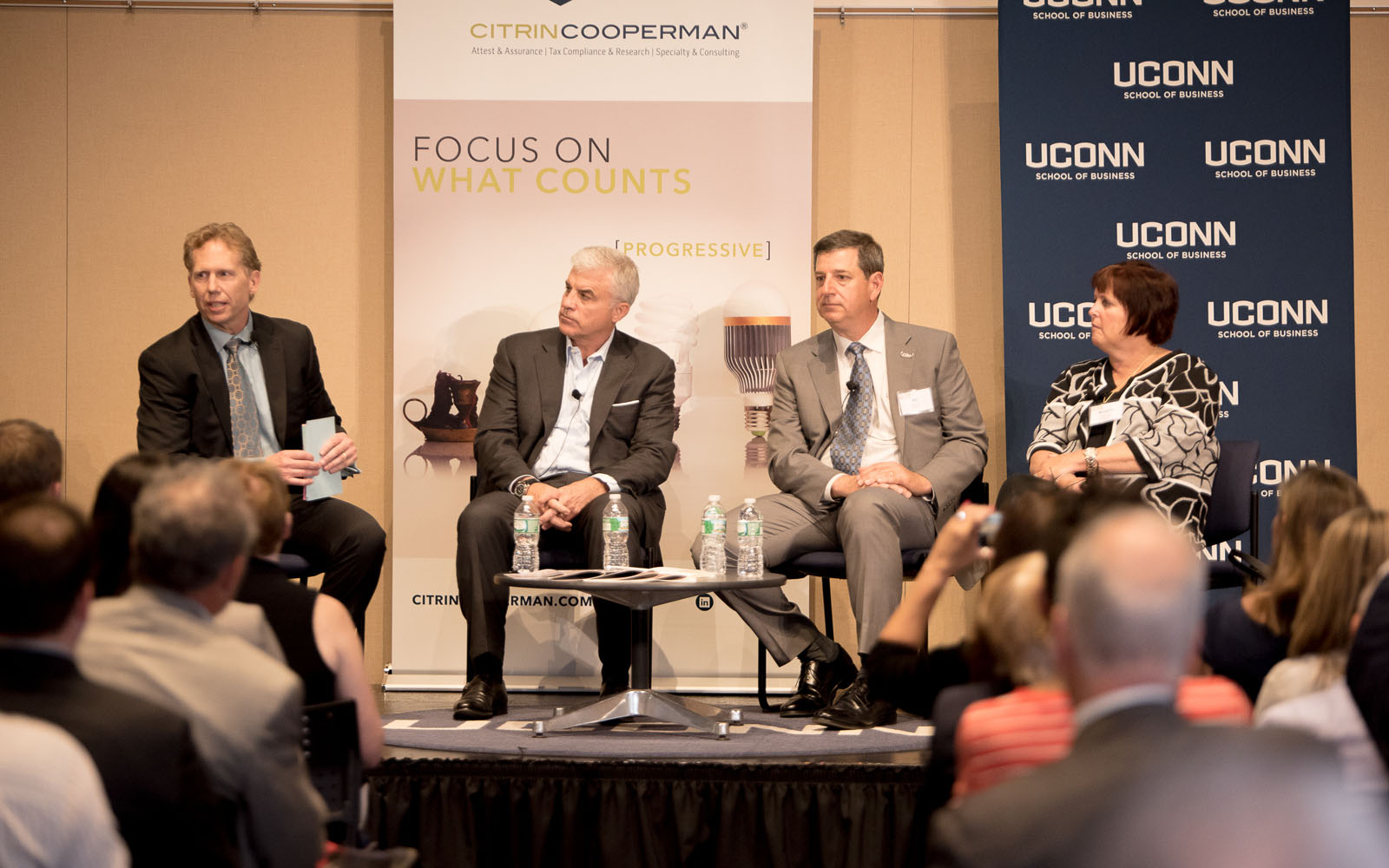Three Top Executives Share Business Advice, Values at ‘CEO Evolution’ Program in Stamford
When UConn alumnus Bill Simon ’81, ’88 MBA, was a newly hired executive at Walmart, before he became its president and CEO, he made a gutsy decision that he knew could make or break his career there.
The low-price retail giant was excelling in its cost-saving mission on many fronts, but when Simon looked at the profit margin on prescription medicine, he realized it could do much better.
His prowess led to the creation of a $4 flat-rate prescription price for many medications. The idea drew applause from the board of directors, but criticism from some pharmacists and segments of the pharmaceutical industry.
“For a new guy, this could have been the shortest career in the world,” Simon joked. “If the board didn’t buy in, I’d have been serving burgers somewhere.”
Subsequently, Walmart grew from approximately 5 percent of the prescription drug-sales in the U.S. to about 15 percent. “If your culture is built around saving people pennies, your leadership needs to be devoted to keeping your expenses at rock bottom,” he said.
Simon was one of three prestigious panelists to discuss their careers and hard-earned business expertise at the “CEO Evolution” program on June 15 at the UConn Stamford campus. The program drew an audience of 250 and was co-sponsored by the UConn School of Business, Citrin Cooperman and the Fairfield County Business Journal.
In addition to Simon, panelists included Margaret Keane, president and CEO of Synchrony Financial and a nine-time member of American Banker’s Top 25 Most Powerful Women in Finance. Scott Gillis, co-founder of Galt & Co., a strategic management advisory firm focused on helping Fortune 300 companies deliver superior shareholder returns, was also on the panel. His company’s clients have included Coca-Cola, Gillette, Clorox, McCormick, Abbott Labs and more. The program was moderated by Mark L. Fagan, managing partner of Citrin Cooperman’s Connecticut office in Norwalk.
Keane spoke about her mission to to promote women, minorities and disabled employees within her organization.
“We view diversity as a critical element,” she said. “We have regular reviews of diverse talent and how are we going to develop them. We include non-exempt employees in our network. We have 70 non-exempt employees now who we hope to graduate into management positions.”
Change, she said, doesn’t happen by chance. At Synchrony, the executives measure their success, model inclusivity and hold people accountable to the company’s values. The company also boasts a very diverse board of directors.
“To create a diverse company… you need to work on it every day,” she said. “The more diverse your organization, the better you can serve your customers.”
Gillis talked about the challenge of maintaining a competitive company in a rapidly changing world and said most organizations are more constrained by internal factors, such as their governance and their management, than they are by outside influencers.
“How do you get all your people rowing in the same direction? It takes communication. What I’ve seen successful companies do is promote their objective and set the standard for the level of knowledge their managers have. You must know your competitive advantage and be aggressive in reallocation of capital so that in effect you are ‘creatively destroying’ your company all the time.”
John A. Elliott, dean of the UConn School of Business, said the third-annual program offers a rare glimpse inside the decision-making challenges and the wisdom of business giants.
“This is the third year that UConn has had the privilege of co-sponsoring this program, which is an unmatched opportunity for the business community, as well as our students, to gain insight from top leaders in today’s rapidly changing business climate,’’ he said. “The expertise of the panel, including alumnus Bill Simon, Margaret Keane and Scott Gillis, their candid discussions and willingness to share their knowledge and insight made for an exceptional program.”



